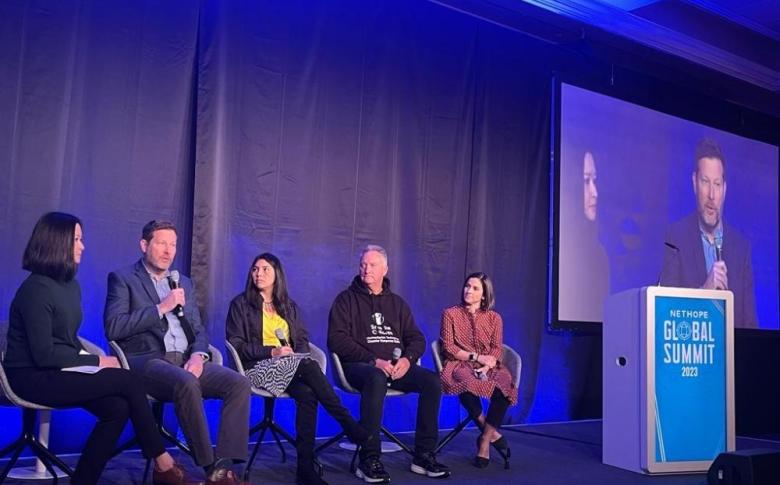Global NetHope Summit 2023: Bridging Digital Divides – together

The annual NetHope Summit is dedicated to exploring how technology can be used to make significant and collective progress in addressing the world's most pressing challenges. The event serves as the epicentre for developing solutions and forging strategic partnerships.
The Emergency Telecommunications Cluster (ETC)’s Global Coordinator―Brent Carbno―attended this year’s Global NetHope Summit from 17 to 19 October held in Munich, Germany. He shares his thoughts, fresh off the plane.
-----------------
Coffee in hand, I step into the conference hall awash with excited chatter on the latest technology solutions and the great work being done by many International Non-Governmental Organizations (INGOs). It’s been four years since we last gathered in person. Memories of the previous summit―when I was still part of the NetHope staff―felt both distant and vivid.
Since that last gathering, the world has transformed. COVID-19 has ravaged countries already on the brink of disaster, and the impact of the pandemic has changed the way humanitarian agencies use technology to respond to emergencies, forever.
Yet amid the changes, some constants in this room remain. Reunions with familiar faces reminded me of the almost 20 years I have spent supporting humanitarian emergencies.
Now, in my capacity as Global ETC Coordinator, I was energized to re-introduce my cluster perspective to the Global NetHope Summit.
Bridging digital divides
This year, I had the privilege of attending the summit both as a participant and as a panelist. The focus of our panel discussion was on bridging the digital divide―a term used to refer to the gap for those who have access to modern ICT tools, and those that don't, or have restricted access. This technology can include phones, television, personal computers, and internet connectivity.
The discussion―organized under a plenary session on technology, partnerships, and collaboration―revolved around the increasing need for coordinated efforts during emergency responses, with an emphasis on local leadership.
As humanitarian organizations increasingly turn to digital services, it's paramount to ensure that these services are secure, appropriate, and accessible to affected populations, recognizing digital connectivity as a fundamental need.
Under this umbrella, the ETC is working in the Sahel region to bridge the digital divide by establishing service centers for affected communities. Not only can people access essential information at the centres, but it also allows them to become more self-reliant in times of crisis. The ETC is currently working with its partners to leverage lessons learned and insights gained from the project to further identify the specific needs of the users, ensuring that the service remains highly relevant to them.
Preparing to respond
In November, the ETC will collaborate with the International Telecommunication Union (ITU) and GSMA to host a regional workshop in the Caribbean. The aim is to bring together various stakeholders, including the mobile industry, humanitarian organizations, and regional government agencies, to improve understanding of emergency telecommunication preparedness initiatives. It seeks to foster collaboration, share insights on network resilience and emergency telecommunication regulations, and develop actionable plans for the short- and medium-term future.
This initiative aligns with the ETC's localization efforts, seeking to strengthen local capacity in the region for self-reliant emergency preparedness and response, and reducing dependence on international support in times of crisis.
What’s next?
The NetHope Summit brought together those who need to be around the table to ensure access to empowering technologies can become the norm: non-profit CEOs, chief information executives, senior-level IT experts, non-profit professionals working in field offices and programs, private sector technologists, United Nations agencies, and representatives from philanthropy, and governments.
All are working towards ensuring an efficient response to crises by leveraging technology and building strong partnerships.
The NetHope Annual Summit is a unique platform for discussions, partnerships, and insights in this field. It showcased the profound impact of technology, collaboration, and local leadership in bridging digital divides and enabling effective humanitarian response.
NetHope member organizations alone represent 60+ leading global INGOs responsible for delivering 60 percent of all international non-governmental aid and collectively serving 1.2 billion people across 190 countries.
As we look to the future, the role of all our organizations to empower communities to access vital digital services becomes more critical than ever.
-----------------
Panelists
Erin Connor, Director of Cisco Crisis Response, Cisco
Stephanie Siy, Deputy Director of Field and Impact Programs, NetHope
Mark Hawkins, Senior Manager, Global Humanitarian Technology, Save the Children International
Claudia Garcia, ICT Manager, Norwegian Refugee Council
Brent Carbno, Global ETC Coordinator, UN World Food Programme
-----------------
Note: NetHope has been a critical member of the ETC since 2011. NetHope helps its non-profit members to effectively address the world's most pressing challenges through collaboration, collective action, and the smarter use of technology. From building a national ICT emergency preparedness network in Ghana to connecting the response in Ukraine, the ETC and NetHope work collaboratively to harness technology as aid.